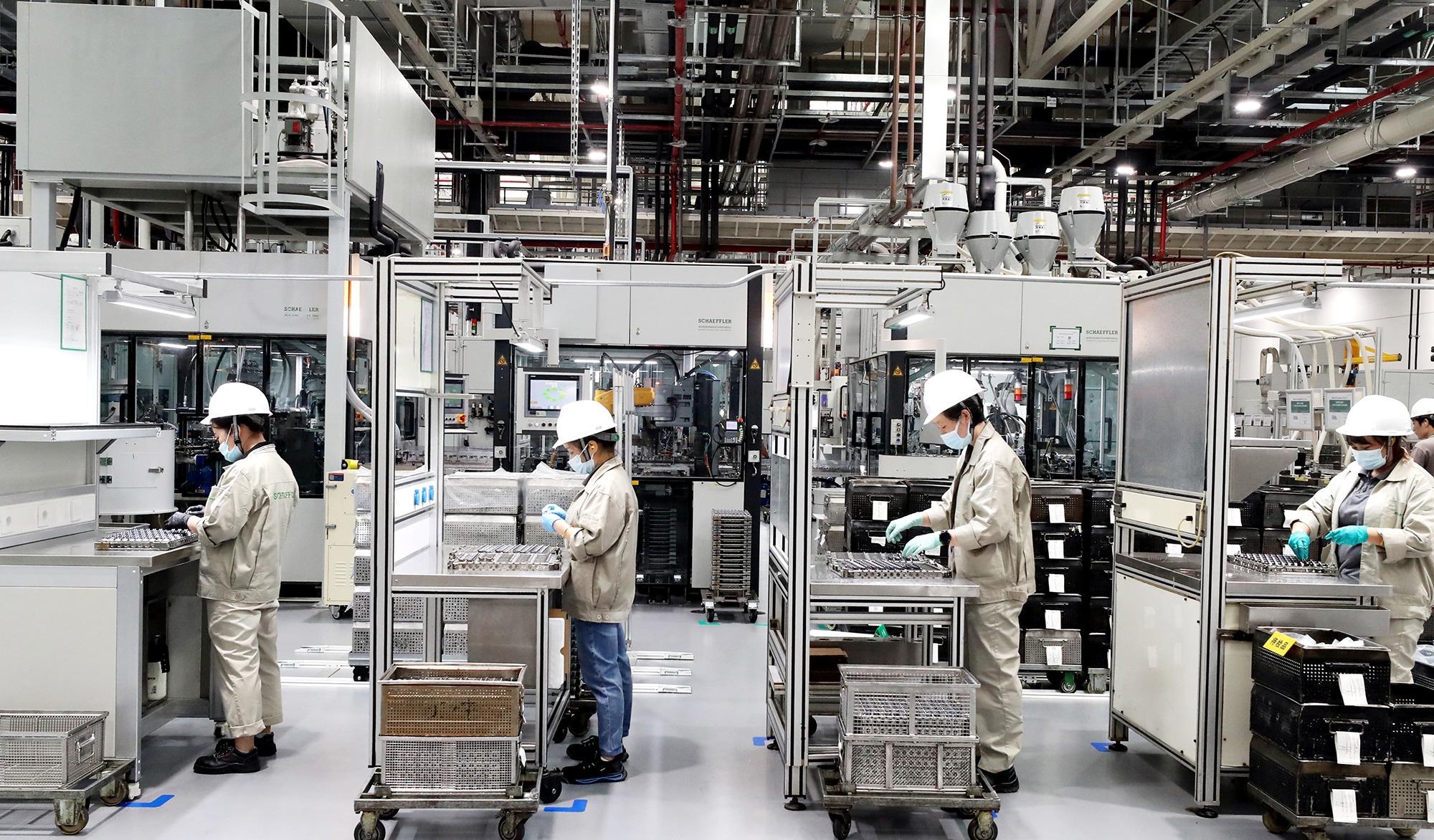County-level city in Jiangsu more attractive among German firms, investors
 Employees of Schaeffler (China) Co Ltd, a unit of Germany-based automotive and industrial parts supplier Schaeffler, work at a production facility in Taicang, Jiangsu province, in November. (HUA XUEGEN / FOR CHINA DAILY)
Employees of Schaeffler (China) Co Ltd, a unit of Germany-based automotive and industrial parts supplier Schaeffler, work at a production facility in Taicang, Jiangsu province, in November. (HUA XUEGEN / FOR CHINA DAILY)
Addressing the leapfrogging development of China's new energy vehicle industry, German auto parts maker Haering GmbH signed an agreement with Jiangsu province's Taicang government in late September for a project to produce lightweight motor spindles for NEV makers.
The investment in the new project stands at $100 million, with annual output expected to reach 500 million yuan ($69.77 million).
The amiable business environment in Taicang as well as strong support and assistance rendered to foreign companies are the reasons that Haering has continued its investment in the city, said the company's owner and CEO Juergen Haering.
With full confidence in Taicang's growth prospects, Haering will increase its technology investment and further enhance the company's core competitiveness, which will also facilitate the company's transformation, he added.
The company's new project is one of 22 new German-invested projects introduced to Taicang via new agreements reached in late September. The combined investment value of these projects amounts to $430 million.
Taking a closer look at data collected by the local government shows that German companies' reach into Taicang has accelerated in the past few months. A total of 26 new German-invested projects with a combined registration capital of nearly $65.2 million were landed in Taicang in the first eight months of this year.
During the agreement signing ceremony in late September, Huang Yuefeng, an inspector of the European affairs department at the Ministry of Commerce, rated Taicang as "the benchmark and role model" concerning bilateral cooperation.
"Over the past three decades, Taicang has attracted a large number of German companies with high-quality and all-round services," he said.
Ever since Kern-Liebers expanded its footprint in Taicang in 1993, serving as the first German company tapping into the 620-square-kilometer county-level city under Suzhou in Jiangsu, nearly 500 German companies have set up operations in the region, bringing over $6 billion in investments. Up to 10 percent of the German manufacturing companies with Chinese operations have built facilities and plants in Taicang, where more than 1,000 Germans are living and working.
By the end of 2007, a cluster of 100 German companies was initially formed in Taicang. The period to attract another 100 German companies was shortened as the goal was reached in 2013. In October 2021, the city was home to 400 German-invested companies.
Last year, Taicang introduced another 60 new German-invested projects. Among them was inspection and certification organization TUV Rheinland's Yangtze River Delta operations center. With an investment reaching 10 million euros ($10.6 million), the Taicang project is TUV Rheinland's largest overseas project to date.
The 12,000-square-meter first phase, which was put into use in mid-December, shoulders research and testing functions for photovoltaic modules, electromagnetic compatibility labs, automotive electronics and auto parts. The second phase, which is expected to complete construction by the end of this year, will include testing labs for textiles, chemicals and electrical safety.
"The reason to land this project in Taicang is not only because of its unique location advantages but, more importantly, the ideal business environment here, which can be proven by the large number of German companies attracted to the area," said Liu Peng, operating general manager of TUV Rheinland (Suzhou) Co Ltd.
"The Taicang government emphasizes the change of government functions and responsibilities. To companies, the government should not interrupt if there is no emergency and companies' requirements should always be addressed," said Duan Yueqiang, deputy director of the investment promotion bureau of the Taicang High-tech Industrial Development Zone.
In late August, the Taicang government rolled out an action plan to make the city's business environment more transparent, fair and predictable. Made up of 165 detailed measures, the plan covers five major areas — policies, market administration and regional regulations, government services and living environment.
At a conference held in late August, Wu Jingyu, Taicang's executive vice-mayor, said that more efforts should be made to further deepen cooperation with German companies. More favorable policies will be introduced to facilitate German professionals' entry into Taicang, technology exchanges and collaboration in the green transition, he said.
The local government has calculated that German companies, though covering only 0.24 percent of the land in Taicang, have contributed 8 percent to the city's annual GDP.
More than 95 percent of the German companies in Taicang with a minimum annual sales revenue of 200 million yuan have localized research and development. Meanwhile, their innovation results have sought localized applications, which have facilitated deeper cooperation between domestic companies, local research institutes and German companies, according to the Taicang government.
Meanwhile, the three industrial clusters for core components of NEVs, aviation and industrial machine tools have been shaped in Taicang thanks to the German companies' extensive footprint, said the local government.
According to Duan of the Taicang High-tech Industrial Development Zone, the major strength and core competitiveness of German industries is the integration between manufacturing and smart technologies.
More than 70 percent of the parts needed for making a car can be found in Taicang, said Duan.
"Apart from the automotive industry, which has continued investment in Taicang, companies specializing in aviation and medical devices have started to emerge," he said.
Cooperation with German companies is the long-term development strategy of Taicang, said the city's Party Secretary Wang Xiangyuan.
"Further efforts will be made to attract more German companies and ensure their prosperity here. We aim to expand and deepen our cooperation with German companies in terms of trade and education," he said.


